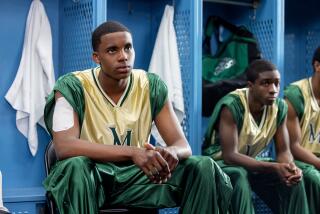‘Linsanity’ documentary is a spine-tingling homage to Jeremy Lin
The magic of the documentary “Linsanity” isn’t so much that it captures the stranger-than-fiction rise of Jeremy Lin from basketball nobody to NBA stardom.
It’s that it makes you feel as if you could be watching someone you know — a brother, cousin, best friend — and that the moments being captured are as authentic as the New York Knicks jersey hanging from Lin’s shoulders.
Lin is shown in the soon-to-be-released movie cherishing a “Lion King” blanket from childhood. He celebrates finding a heavily discounted mini-water fountain for his apartment. He sings for a roomful of friends and family — and he’s awful.
The unfettered access that rookie director Evan Jackson Leong was granted starting with Lin’s career at Harvard provides an intimate portrait of a sometimes goofy, always lovable player just trying to prove he belongs on basketball’s biggest stage.
Of course, few would care had Lin not captured the world’s attention with his stirring run of performances for the Knicks in February 2012.
Lin’s rise reaches its climax in a game at Madison Square Garden against the Lakers. In typical Kobe Bryant fashion, the Lakers star brushes off talk about Lin’s brilliance before the Knicks point guard makes him painfully familiar with his exploits by scoring a career-high 38 points.
Southern California basketball fans will be intrigued by two other scenes — Lin’s spot-on impression of then-Knicks (and current Lakers) Coach Mike D’Antoni hemming and hawing when Lin asks him whether bringing his car to New York is a good idea and his role in leading Palo Alto High to a victory over heavily favored Santa Ana Mater Dei in a state championship game.
The 88-minute homage to the underdog opens in select cities Oct. 4, including AMC Atlantic Times Square in Monterey Park.
“Linsanity” diverges from “Hoop Dreams,” the gold standard for basketball documentaries, in several ways. Raised by Taiwanese immigrants in Northern California, Lin hails from a comfortable upbringing and never had to deal with the family strife that makes the plight of “Hoop Dreams” protagonists William Gates and Arthur Agee so compelling.
The flip side is that Gates and Agee never had to deal with race in the way that it affected Lin. He was largely dismissed going all the way back to his days as a club basketball neophyte who was later passed over by scores of Division I colleges and every NBA team in the 2010 draft before the Dallas Mavericks put him on their summer league roster.
Lin’s season with the Knicks was marred by bad headline puns and racial slurs. A handful of cringe-worthy moments are captured in the film, including Lin talking about how a security guard at Madison Square Garden initially wouldn’t let him into the arena because he didn’t believe Lin played for the Knicks.
Some may feel squeamish about a religious undercurrent that makes a literal splash in the film’s final moments when Lin is shown walking on water. But the fact is that Christianity is as essential to Lin as the pick and roll is to a point guard in D’Antoni’s offense; the movie would be amiss if it didn’t give religion its due.
“Linsanity” also appeals to the virtues of hard work and perseverance, which carried Lin through multiple stints in the Development League and dark moments when he was cut by the Golden State Warriors and Houston Rockets, who would later sign him to a three-year, $25-million contract.
Sometimes dreams really do come true.
ALSO:
CBS to have Johnny Manziel covered with ‘Johnny Cam’
NASCAR penalizes Waltrip team, puts Ryan Newman in Chase
LA KISS offers Tim Tebow a three-year contract to play arena ball
More to Read
Go beyond the scoreboard
Get the latest on L.A.'s teams in the daily Sports Report newsletter.
You may occasionally receive promotional content from the Los Angeles Times.











